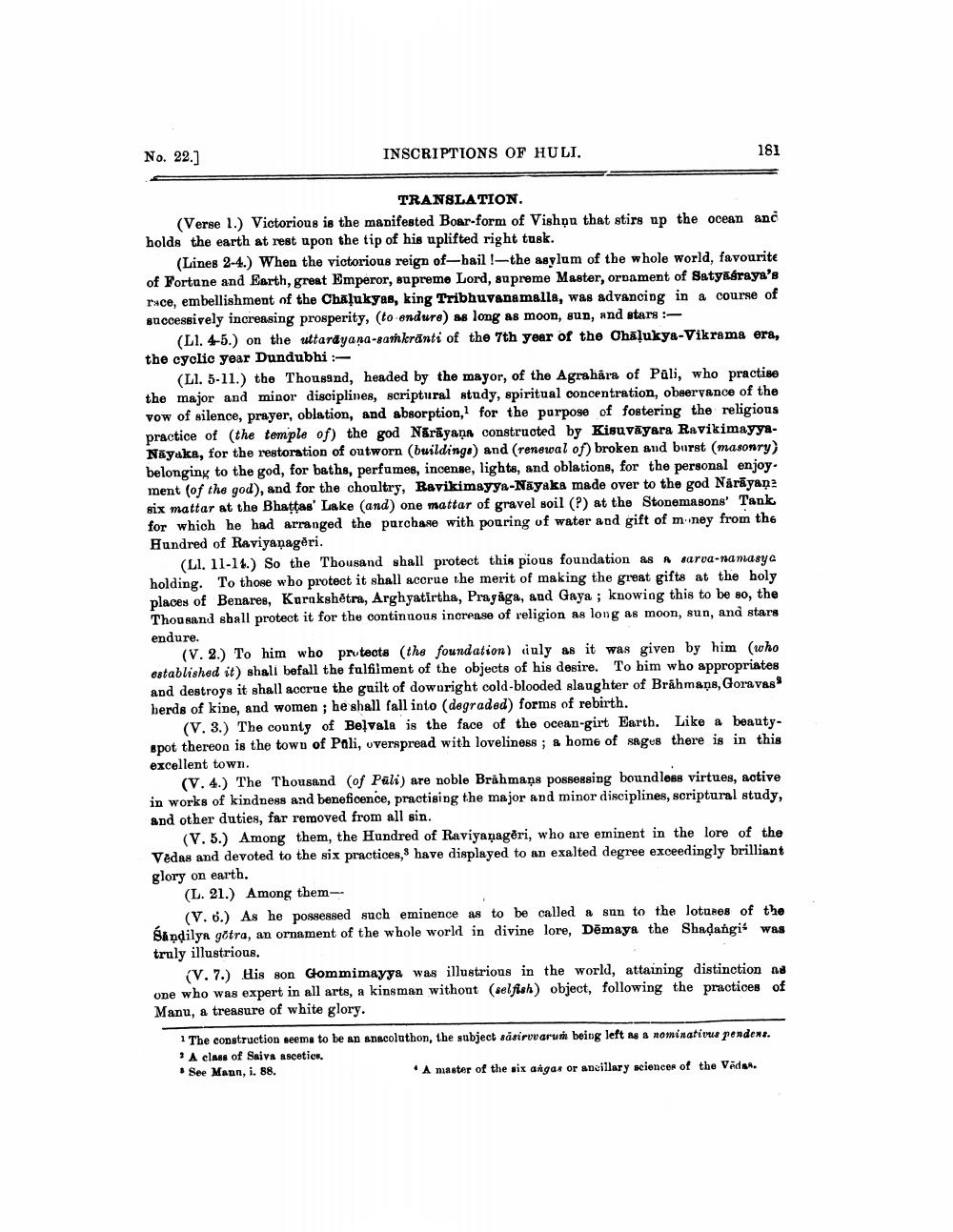________________
No. 22.]
INSCRIPTIONS OF HULI.
181
TRANSLATION (Verse 1.) Victorious is the manifested Boar-form of Vishọn that stirs up the ocean and holds the earth at rest upon the tip of his uplifted right tusk.
(Lines 2-4.) When the victorious reign of-bail !--the asylum of the whole world, favourite of Fortune and Earth, great Emperor, supreme Lord, supreme Master, ornament of Satyagraya's race, embellishment of the Chalukyas, king Tribhuvanamalla, was advancing in a course of successively increasing prosperity, (to endure) as long as moon, sun, and stars :
(Ll. 4-5.) on the uttardyana-samkrānti of the 7th year of the Ohalukya-Vikrama era, the cyclic year Dundubhi :
(Ll. 5-11.) the Thousand, headed by the mayor, of the Agrahara of Pali, who practise the major and minor disciplines, scriptural study, spiritual concentration, observance of the vow of silence, prayer, oblation, and absorption, for the purpose of fostering the religious practice of the temple of) the god Nārāyaṇa constructed by Kisuvāyara Ravikimayya. Nayaka, for the restoration of outworn (buildingo) and (renewal of) broken and burst (masonry) belonging to the god, for baths, perfumes, incense, lights, and oblations, for the personal enjoy. ment of the god), and for the choultry, Ravikimayya-Nayaka made over to the god Nårāyaṇa six mattar at the Bhattas' Lake (and) one mattar of gravel soil (?) at the Stonemasons' Tank for which he had arranged the purchase with pouring of water and gift of money from the Hundred of Raviyanageri.
(Ll. 11-14.) So the Thousand shall protect this pious foundation as A sarva-namasya holding. To those who protect it shall accrue the merit of making the great gifts at the holy places of Benares, Kurukshētra, Arghyatirtha, Prayaga, and Gaya ; knowing this to be so, the Thousand shall protect it for the continuous increase of religion as long as moon, sun, and stars endure.
(V. 2.) To him who protects the foundation) duly as it was given by him (who established it) shall befall the fulfilment of the objects of his desire. To him who appropriates and destroys it shall accrue the guilt of doworight cold blooded slaughter of Brāhmans, Goravas berds of kine, and women; he shall fall into (degraded) forms of rebirth.
(V. 3.) The county of Beļvala is the face of the ocean-girt Earth. Like a beautyspot thereon is the town of Pali, uverspread with loveliness ; & home of sages there is in this excellent town.
(V. 4.) The Thousand (of Pūli) are noble Brahmans possessing boundless virtues, active in works of kindness and beneficence, practising the major and minor disciplines, scriptural study, and other duties, far removed from all sin.
(V.5.) Among them, the Hundred of Raviyanagðri, who are eminent in the lore of the Vedas and devoted to the six practices, have displayed to an exalted degree exceedingly brilliant glory on earth.
(L. 21.) Among them
(V. 6.) As he possessed such eminence as to be called a sun to the lotures of the sandilya götra, an ornament of the whole world in divine lore, Dēmaya the Shadangi was truly illustrious.
(V. 7.) His son Gommimayya was illustrious in the world, attaining distinction ng one who was expert in all arts, a kinsman withont (selfish) object, following the practices of Manu, a treasure of white glory.
1 The construction seems to be an anscolathon, the subject sasiruvaru being left as a nominativus pendent. - A class of Saiva ascetier. . See Mann, i. 88.
A master of the six angas or ancillary sciences of the Vedas.




